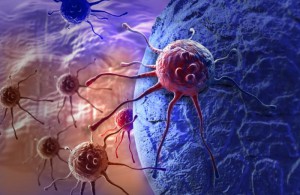Recently, a scientific report has published that Kathlynn Brown and Michael McGuire from the University of Texas developed a novel polypeptide through an ingenious method, which could be used in cancer imaging and therapy. Does this indicate a fact that a new cancer therapy will be developed?
 It’s common to know tumor cells are easy to uptake of the polypeptide with biochemical small molecules. Scientists are taking advantage of such fact to develop some new cancer treatments. They have long been trying to understand and treat various cancers for better clinical applications. Although the survival rate of cancers is gradually improved, people have not found the so-called perfect treatment so far. Challenge that people have to face is to make cancer drugs reach the most necessary treatment area, and effectively come into the cells. Drugs in blood often merely reach part region of the tumor. This is because the higher the internal pressure of the tumor is, the easier the liquid tends to flow. Therefore, it might cause the drugs in blood difficult to spread inside. In addition, because the vast majority of cancer drugs are toxic, the dosage cannot be too much.
It’s common to know tumor cells are easy to uptake of the polypeptide with biochemical small molecules. Scientists are taking advantage of such fact to develop some new cancer treatments. They have long been trying to understand and treat various cancers for better clinical applications. Although the survival rate of cancers is gradually improved, people have not found the so-called perfect treatment so far. Challenge that people have to face is to make cancer drugs reach the most necessary treatment area, and effectively come into the cells. Drugs in blood often merely reach part region of the tumor. This is because the higher the internal pressure of the tumor is, the easier the liquid tends to flow. Therefore, it might cause the drugs in blood difficult to spread inside. In addition, because the vast majority of cancer drugs are toxic, the dosage cannot be too much.
Kathlynn Kathlynn Brown and Michael McGuire have discovered a new polypeptide utilizing modern biotechnology, such as creative peptide, peptide synthesis, and so on. This unique polypeptide has attracted increasing attention in the medical community. Actually, such peptide can recognize cancer cells and wherein medicament the drugs to those targeted drugs, which possess some obvious advantages. Previously, people always tried to target the cancer cells through a monoclonal antibody, but modifying the antibody is very complex, as well as relatively high cost. In addition, hypersensitivity might appear because of the post-translational modifications. For this reason, only ten kinds of monoclonal antibodies have been approved by the FDA for cancer treatment so far.
In sum, based on the case, polypeptide has played an important role in tumor research so that the researchers begin to turn more attention to the functions of the polypeptide. Smaller than the antibody, with no toxicity and antigenicity, polypeptide can be easily modified and synthesized in a large scale. Maybe a new anti-tumor strategy will be developed with polypeptide.